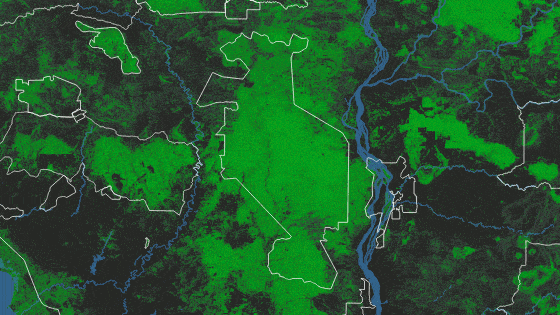
Cambodian deforestation (years 2011 to 2021) within and around Prey Lang.

Environmental rights activist (PLCN), Preah Vihear province
Prey Lang forest is the largest lowland evergreen forest in Southeast Asia and one of the most biodiverse forests in Cambodia, containing threatened animal and plant species alongside key sources of water for the country’s rivers. It houses the Prey Lang Wildlife Sanctuary, and was estimated to cover around 500,000 hectares. Prey Lang is also home to many people, including indigenous Kuy.
Prey Lang has played a critical part in the Kuy people’s lives and culture for generations. The very name “Prey Lang” translates to “Our Forest” in the Kuy language. But the forest is now besieged by illegal logging, and its existence is under threat. Deforestation has severely reduced the size of the forest. Exact figures are unavailable, but what remains of Prey Lang today is between 130,000 to 350,000 hectares.
The number of storms has increased every year, as has the number of floods near Prey Lang […] There are increased heatwaves. The rain has become irregular, so growing crops is no longer good for us.
Khem Sokhy is an environmental activist and Prey Lang Community Network (PLCN) member who regularly patrols Prey Lang. PLCN is a group of local community members who protect the forest from illegal logging and industrial agriculture. During the recent decades of widespread deforestation across Cambodia, Prey Lang has been specifically targeted due to the prevalence of luxury wood species, which fetch high prices in the furniture industry.
Patrollers like Sokhy enter the forest for days at a time, recording illegal logging and initiating peaceful discussions with illegal loggers when possible. “Our patrol team contains about 30 people. In previous years, we confiscated chainsaws from loggers and asked them to sign documents pledging to stop their illegal activities,” says Sokhy. “We handed the confiscated materials to the relevant officials.”
Sokhy’s environmental activism began around 2013 to 2014, when he noticed natural resources being destroyed at tremendous speed. He is worried that Prey Lang would soon disappear, with devastating consequences. “The number of storms has increased every year, as has the number of floods near Prey Lang […] There are increased heatwaves. The rain has become irregular, so growing crops is no longer good for us,” Sokhy says.
Sokhy speaks at his home in Preah Vihear.
Sokhy’s activism comes at a personal cost. “In recent years, Prey Lang Community Network has been harassed,” he explains. “I was arrested in Kratie province and sent to court. I myself have been beaten in Prey Lang. An environmental official, who is supposed to help protect our natural resources, once beat me. That is an unforgettable memory for me.” He explains how a private company filed a complaint against him because he and other activists had taken photos of the company engaging in illegal activities.
“Trespass charges were brought against us,” he adds, emphasising the authorities’ active engagement in suppressing his activism. “Relevant officials have treated me badly and asked me to provide a thumb print [formally acknowledge a document], forcing me to stop entering the forest. That was tough for me.”
I urge everyone whose breath relies on the forest: you should take part in protecting it.
Sokhy has even been targeted at his home, with pressure and intimidation extending beyond the bounds of Prey Lang. Gesturing towards the platform in front of his house on which he is seated, he describes how people have attempted to negotiate for his silence there. “They try to bribe me to stop my activism, with suggestions of money and a new house.”
Sokhy’s refusal to compromise his environmental activism has been met with threats to his life. “[One logging company] said that they will shoot us dead wherever they see us,” says Sokhy. Military and district police have compared him to Chut Wutty, a prominent environmental activist who was shot dead during a forest patrol.

Cambodian deforestation (years 2011 to 2021) within and around Prey Lang.
But Sokhy refuses to be intimidated. “Prey Lang has become smaller and smaller,” he says. Sokhy has so far endured the physical harassment that comes along with his work, because what he fears most are the consequences of Prey Lang’s destruction for him and his community. “The loss of protected forest will severely affect surrounding communities. They are the ones fully reliant on forest products. Without them, people will migrate to other places for jobs to earn income for their families.”
According to Sokhy, authorities also claim that his community’s actions are illegal, as PLCN is not a formally registered organisation. “Registration is not our obligation because everyone has the right to protect and enter the forest – not only government officials.”
Sokhy’s vison for the forest is clear: “My dream is to see Prey Lang classified as a protected area, and to have it as a tourist attraction for all to see the rare wood, the tall trees of the jungle […] people could see wildlife, and take photographs of this beautiful forest.” His message for government is clear: tighten the relevant laws and properly penalise those who damage it.
“It is not too late to take part in protecting our resources [...] We have to boycott the timber trade,” says Sokhy. “I urge anyone whose breath depends on the forest: please help protect it.”